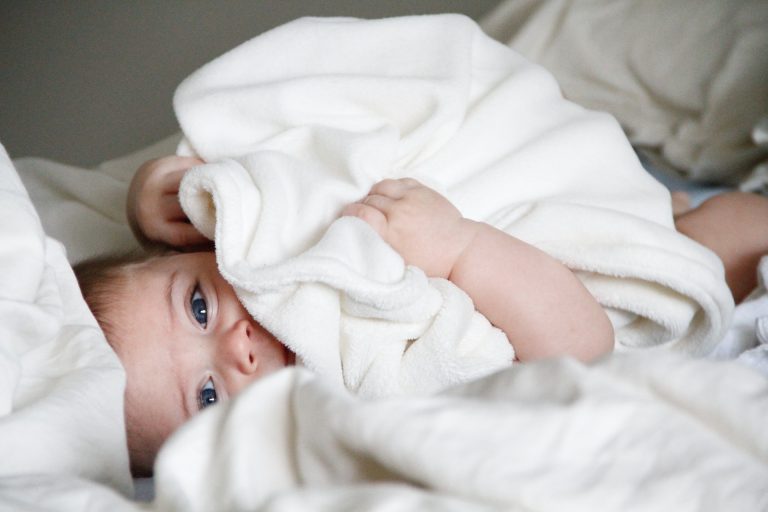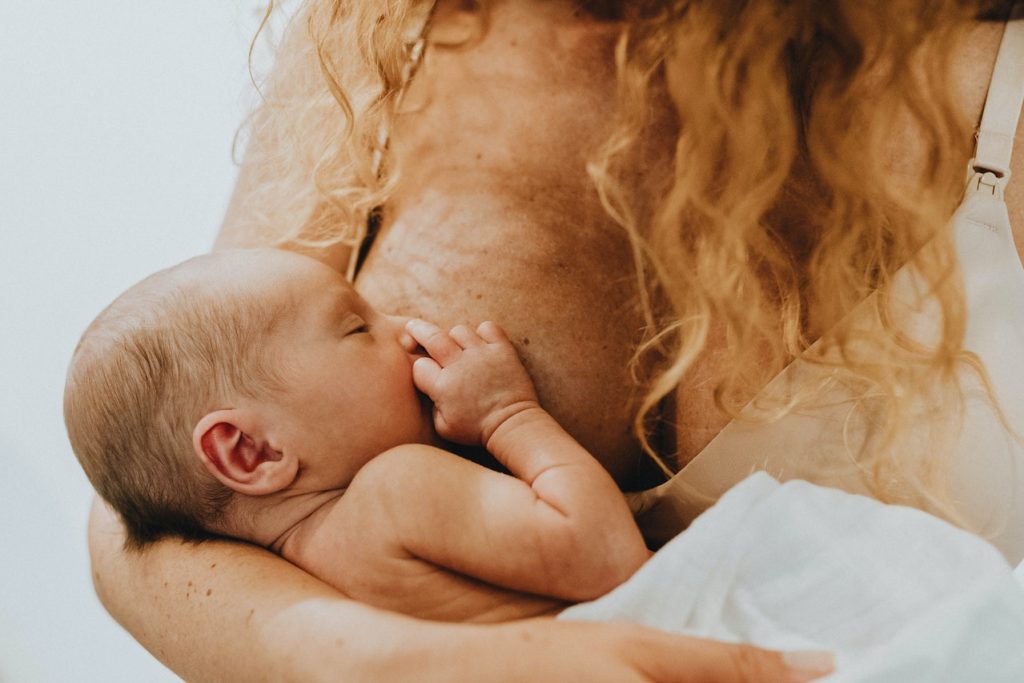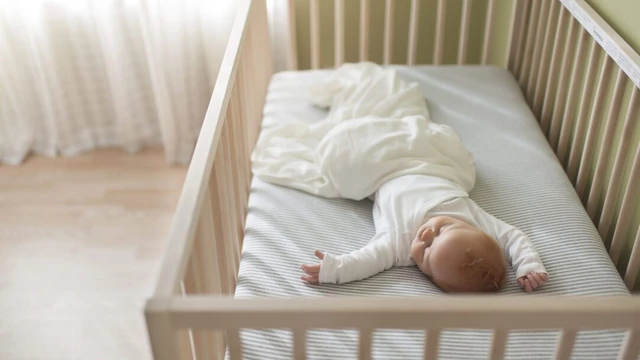
Reclaim Your Beauty Sleep: How To Handle Your Baby Waking Up Too Early
- Created:
1. 9. 2023 - Updated:
10. 1. 2024
Admit it:
After the hassle of putting them to sleep, seeing your baby awake before your morning coffee can be frustrating.
Not to mention:
Consistent early wakings could become concerning for any parent. But how do you take care of this situation?
I’ve got you covered.
Tag along as we explore possible causes of your baby waking up too early and how to improve their sleep.
Let’s go!
Causes of Early Wake-Ups
Fact:
Babies are naturally early wakers. However, they can wake up too early, and that’s never any good, especially when it happens frequently.
The truth is:
Navigating this phase can be difficult if you don’t know what causes it.
Fortunately:
Let’s discuss possible reasons why your baby is waking up too early below.

1. Hunger
Did you know?
According to La Leche League International, babies could eat up to 12 times within 24 hours.
So it’s only expected that sometimes they wake up early due to hunger. However, if they continue in this pattern, you might have to upgrade their feeding amount.
Here’s the thing:
Babies have tiny stomachs but constantly growing bodies that need the energy supply. Because of this, your infant might be full in one moment and hungry in the next.
In the end:
Their stomachs would send an emergency alert to the brain. And, in turn, it would wake the baby even if they are in the deepest slumber.

2. Daytime Stress or Tiredness
Hear me out:
It may not seem like it, but if your baby is stressed or tired, they won’t sleep well at night.
I’ll explain why:
When your baby goes through elevated stress during the day, their body releases hormones like cortisol and adrenaline. These hormones keep the baby’s body active and make it increasingly difficult for them to fall asleep and stay asleep.
Now:
A baby’s system needs utmost calm for them to fall asleep. Their body and mind can’t sync or relax if stress or tiredness disrupts this calm. And since the final stages of infant sleep towards the morning are light, this disarray wakes them up.

3. Sleep Environment
First off:
Babies are sensitive to their surroundings. Because of this sensitivity, any slight disturbance can disrupt their sleep.
For example:
Exposing your baby to light while they’re asleep could wake them up. This light doesn’t necessarily have to come from a lightbulb. In fact, it could be from the sun’s rays seeping in through the curtains early in the morning.
And babies learn fast. So if this sunray exposure becomes a pattern, their circadian rhythm could reset to begin naturally waking early.
Therefore:
Knowing where your baby should sleep and what conditions help them sleep best is always a good idea.

4. Illness
Get this:
Illnesses such as a cold or flu could cause your infant to lose vital sleep by waking too early.
Generally:
These sicknesses present symptoms such as fever, discomfort, or sometimes pain. And in turn, these symptoms could wake the baby up during the final sleep phase.
Now:
Sometimes, illnesses could mark developmental milestones. For instance, when your baby starts teething, they could present with inflamed gums and high body temperatures.
Either way:
Whether developmental processes or infections cause the sickness, monitoring your baby’s health is essential. This is because they won’t get adequate sleep if they aren’t healthy enough.

5. Too Much Daytime Sleep
Want to know a secret?
Daytime sleep in babies has a direct effect on nighttime sleep.
Thats right!
The more sleep your child gets during the day, the less they sleep at night. This means if your child has too much daytime sleep, it becomes difficult to put them to sleep and keep them asleep.
Factually:
This might not be a problem if it rarely happens. However, consistent recurrence is a red flag.
Plus:
Your baby’s sleep routine naturally reduces in duration as they grow older. The National Childbirth Trust says that as babies grow, their sleep time will decrease to around 15 hours. And that’s completely normal.
But:
If you want your baby to get their much-needed nighttime rest, you must balance naps and nighttime sleep.
Impact of Early Wake-Ups On the Baby And the Parents
As we’ve mentioned:
Early wake-ups are normal for babies, especially newborns.
However:
The last thing you want is for your baby not to get the rest they need to grow. Moreover, this phase can be tough for parents and infants physically, mentally, and healthwise.
It also dampens the day’s tone and disrupts your baby’s feeding schedule. But it doesn’t just stop there.
Here are four ways early wake-ups can impact the baby and the parents:
- If your baby wakes up too early, they become restless throughout the day. This restlessness comes with crying and discomfort, which could disorient the parent and cause frustration.
- Babies who wake too early typically experience disrupted feeding routines. This causes the parent to undergo the stress of planning their feeding all over again.
- If your baby wakes too early, they might not get enough sleep for their body to develop adequately. This causes slow weight gain and increases the time they use to reach developmental milestones.
- Your little one would likely be exhausted and overly stressed without proper sleep. This potentially opens doors to illnesses and a general reduction in the baby’s well-being.
Tips To Prevent Early Wake-Ups
Here’s the big question:
How do I prevent my baby waking up too early?
Well, I’m here with some good news:
Helping your baby sleep better is easy to do. And in this section, I’ll provide tips to prevent early wakeups.
Ready?
1. Try a Dream Feed
It’s a no-brainer:
If hunger causes your baby to wake early, preventing hunger pangs while they sleep is an ideal solution. A great way to do this is to dream feed.
Basically:
Dream feeding means gently rousing your baby while they’re still asleep and feeding them. This process aims to fill your baby’s stomach, so they don’t wake due to hunger.
Pro tip:
To avoid startling your baby awake, wait until they’re in the deep sleep phase before attempting to dream feed.
2. Provide a Dark Sleep Environment
Even as an adult, waking up to a very bright light isn’t the most pleasant feeling.
It’s the same for babies.
Essentially:
Exposure to the bright light from sun rays in the morning could force your baby out of their sleepy state.
To curb this:
Simply ensure your baby sleeps in a dark, noiseless, and comfortable environment. You can close the curtains to prevent light from seeping in and waking your baby.
Also:
Turn off the lights and lay your baby on a firm but not a hard bed, be it a cradle or bassinet.
3. Watch Wake Windows
Fundamentally:
A wake window is the period between naps that your baby spends awake.
Now:
Watching your baby’s wake windows is vital because they tell you just how much sleep your child is getting. You can compare this to the recommended baby wake periods to know whether to help your baby get more sleep.
Moreover:
Your baby could get stressed or overtired if they don’t get enough sleep. So it’s always best to note their wake windows and apply it to optimize their sleep.
4. Use White Noise
Fact:
White noise is a popular and effective way to optimize your baby’s sleep.
Primarily:
It reminds the baby of their happy place—the womb. Hence, these soft, soothing sounds make the baby feel safe and comfortable enough to fall asleep and maintain sleep.
Additionally:
It silences external noises and draws the baby’s focus to its soothing sounds so they can sleep soundly.
5. Avoid Overstimulation
Many parents don’t know this, but overstimulation is a primary cause of early wake-ups in babies.
How so?
Overstimulation in babies occurs when they experience more stimuli than they can handle or are used to. These stimuli could come from overhandling the baby, noisy or busy environments, or too much screen time.
Consequently:
Overstimulation causes your baby to feel hyperactive and show signs like clenching their fists, crying, or hyper-vigilance. So, it’s best to avoid overexerting the infant.

When To Seek Medical Attention
Frankly:
A one-time early waking might not be a cause for alarm, but there are special situations that require medical attention.
For example:
If early waking becomes a routine or comes with illness, you should consult a professional for help.
Now:
If your baby is waking up too early, it is important to identify the cause of the early wake-ups. This requires closely observing your child and studying their sleep patterns as well as other factors that affect their sleep.
However:
When unsure of the cause of early wakings, you can seek advice from your pediatrician or a sleep consultant.
Additionally:
In dire situations, when your baby has a fever or is struggling to breathe, you should seek medical attention immediately.
Final Tip: Annie Baby Monitor – Your Sleep Solution Partner
Getting up early due to your baby can be tough, but with Annie Baby Monitor, you’ve got a great ally.
The secret to better sleep is understanding your baby’s sleep habits, and Annie is amazing at that.
Just use its sleep tracking features to learn what your little one likes and create a routine that works for both of you.

Annie Baby Monitor is the perfect guide for more peaceful mornings and better sleep for both you and your baby.
Conclusion
Early wakings in babies are normal, but they could become concerning if they occur frequently.
In essence:
These early wake-ups happen because your baby is hungry, ill, overtired, uncomfortable, or overstimulated.
Luckily:
We’ve listed helpful ways to make your baby sleep a little longer. Here’s a quick recap of the tips to prevent early wake-ups:
- Provide a dark and comfortable sleep environment for your baby
- Apply white noise
- Try dream feeding
- Limit stimulations before bedtime
- Watch your baby’s wake windows
Remember:
If you notice your baby waking up too early too often, contact a pediatrician immediately to know what’s happening.
I hope you found this guide helpful. If you did, let me know in the comments. Feel free to leave your suggestions, questions, and concerns in the comment section, and I’d respond promptly.
FAQ: Baby Waking Up Too Early
There are several reasons why a baby might wake up too early. Some common reasons include hunger, illness, or overstimulation. An uncomfortable sleep environment could also cause your child to wake up too early.
To help your baby sleep later in the morning, try dream feeding or using white noise. You should also avoid overstimulating them before bed. And provide a dark, comfortable environment for their sleep.
To prevent early wakings, you can reduce nap durations or frequency if their daytime sleep is too high. Or, you could help them catch more naps if their daytime sleep is too low. In all, be flexible and patient with your baby while adjusting their schedules, as they need time to adapt.






